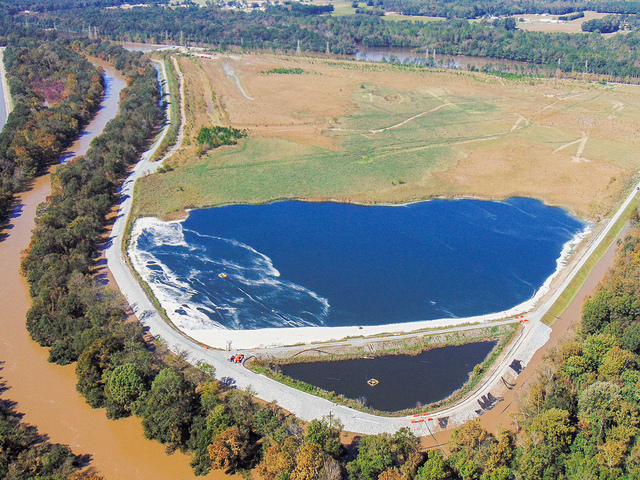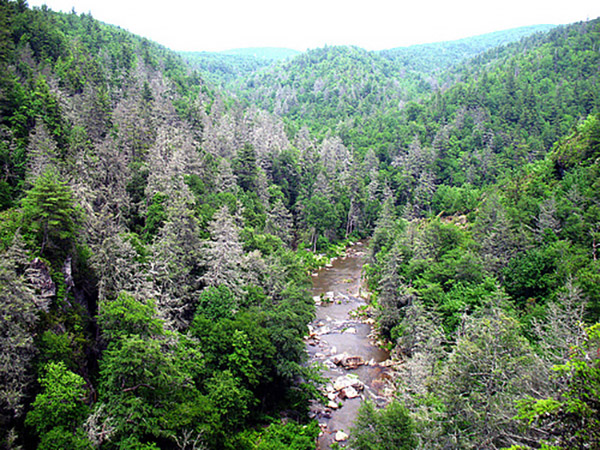Cleaning Up Coal Ash
For well over a century, power plants across the country have burned coal to generate electricity. And for just as long, leftover coal ash has been dumped in open, unlined pits near the power plant, usually located on a river or lake. Every year, U.S. power plants produce 130 million tons of coal ash, which is the second largest waste stream in the country after municipal garbage.
Coal ash concentrates the toxic heavy metals found in coal, including arsenic, mercury, lead and selenium. Stored in unlined, wet impoundments, coal ash has been leaking these toxics into our groundwater and surface waters for years. Sometimes these impoundments collapse — with disastrous results.
Yet government regulations for coal ash management are either non-existent or sparse, and there is little enforcement of the regulations that do exist. In North Carolina, this lack of oversight — and the complicity between state regulators, elected officials and Duke Energy — came to a boiling point in February 2014 when one of Duke’s coal ash impoundments spilled 39 million tons of ash into the Dan River.
Citizens living near North Carolina’s 33 coal ash impoundments — all of which have leaked — have fought for transparency from Duke and the state, and for cleanup of the pollution that threatens their property value, health and family. Their actions forced this issue into the headlines of news networks and to the forefront of environmental justice conversations in the United States.
Appalachian Voices stood with these communities as we worked for years to compel Duke Energy and the N.C. Department of Environmental Quality to excavate coal ash from all the North Carolina sites and dispose of it either in lined, dry landfills, away from waterways, or by recycling it for concrete or other uses, provided it’s done in a manner that protects public health and the environment.
On Jan. 2, 2020, North Carolina announced a historic settlement with one of the state’s most powerful corporations and polluters, Duke Energy. The settlement requires Duke to move nearly 80 million tons of toxic coal ash at six of its power plants to properly lined landfills onsite or recycle it.

Learn information about specific coal ash impoundments in the South, including health threats and safety ratings:
Additional Resources
Fact sheets, videos, links to academic research, and more
Sign Up to Act
Help us protect the health of our communities and waterways.
Latest News
Citing major gaps, groups call on federal agency to revise Mtn Valley Pipeline study
Contacts: Ben Luckett, Appalachian Mountain Advocates: (304) 645-0125…
Hurricane Matthew flooding elevates coal ash concerns
Earlier this month, North Carolina was devastated by the impacts of Hurricane Matthew. Flooding occurred across much of the state, with the hardest impacts felt in the east and among communities that are least able to bounce back from such a catastrophic event. While the flood waters are still receding, we are learning about the impacts left in their wake.
Environmental justice in Buckingham County
A proposed compressor station along the Atlantic Coast Pipeline route would pose public health risks and increase noise pollution in a rural, historically black community. Citizens are fervently urging local officials to reject the project, which would severely impact the viability of the pipeline overall.
Solar and energy efficiency…like peanut butter and jelly
While energy efficiency is just as clean as solar when it comes to emissions, efficiency by itself can’t produce energy for customers looking for a clean energy option, and solar without energy efficiency can’t reach the full extent of its potential. Both are valuable and can, and should, work together as an integrated solution to create cleaner and cheaper energy.
Fostering Climate Resilience
As climate change begins to impact Appalachia, scientists and community activists look for ways to study and adapt to the changes.
Across the Years: Updates from the Archives
In honor of our 20th anniversary, we looked through The Appalachian Voice archives to identify important topics that we’ve covered over the years and provide updates on where these issues stand today.









